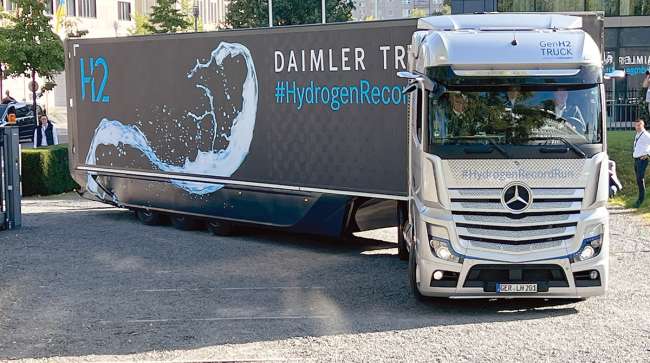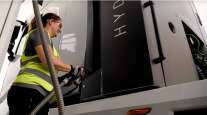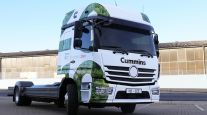Staff Reporter
Daimler Partners With Amazon for Fuel Cell Truck Trials

[Stay on top of transportation news: Get TTNews in your inbox.]
Daimler Truck plans to begin the first on-road customer tests of hydrogen fuel cell-powered Mercedes-Benz GenH2 trucks in global markets in the middle of 2024, the German parent of Daimler Truck North America said Dec. 19.
Amazon, Air Products, Ineos, Holcim and Wiedmann & Winz will take part in initial customer trials of the trucks. The manufacturer views fuel cell technology as elemental to reducing emissions for long-distance trucking.
The GenH2 truck is based on a conventional Mercedes-Benz Actros cabover longhaul truck. It has two liquid hydrogen tanks and a fuel cell system. The fuel cell system of the GenH2 delivers 300 kilowatts and the battery provides an additional 400 kW
Daimler Truck is using liquid hydrogen for the GenH2 due to its high energy density. This significantly increases the range while offering comparable performance to that of a conventional diesel truck, which enables higher payloads, it said.
Entering the next development phase on the road to decarbonize #transportation with hydrogen-powered fuel-cell trucks. From mid '24, @amazon, @AirProducts_EU, @INEOS, @Holcim & Wiedmann & Winz GmbH will take part in customer trials.
➡https://t.co/MIlWtgbo9e#GenH2 #DaimlerTruck pic.twitter.com/irjQ1Ds3Xq — Daimler Truck AG (@DaimlerTruck) December 19, 2023
Also making its debut during the pilots will be a refueling process that Daimler Truck is terming “sLH2 technology.” Developed jointly with industrial gases specialist Linde using subcooled liquid hydrogen, the technology allows higher storage density and refueling times of around 10-15 minutes.
The trucks will be built at Daimler Truck’s Wörth am Rhein plant, which recently celebrated its 60th anniversary. The plant, which can build up to 470 trucks per day, is expected to produce diesel, battery-electric and hydrogen fuel cell electric tractors as part of Daimler Truck’s decarbonization plans.
Daimler Truck aims to offer a lineup of vehicles that are CO2-neutral when being driven in its core markets of Europe, the U.S. and Japan by 2039.
Similarly, e-commerce giant Amazon, which ranks No. 1 on the Transport Topics Top 50 Global Freight Carriers list and No. 9 on the TT Top 100 private carriers list, aims to halt or offset its share of the greenhouse gas emissions warming the planet by 2040.
“Amazon is continuously working toward becoming carbon neutral by 2040. The decarbonization of our transport network plays a crucial role in achieving this milestone,” said Andreas Marschner, Amazon Transportation Services vice president.
“All logistics stakeholders — from manufacturers to energy companies and operators — must therefore continue to invest, experiment and innovate. We look forward to participating in this pilot project and learning from it,” he added.
ERoad's Craig Marris gives advice on carving out a practical, effective road map to a greener and more efficient fleet. Tune in above or by going to RoadSigns.ttnews.com.
Daimler Truck in September demonstrated the potential of the GenH2 by taking it on a 650-mile run in Germany. The overnight autobahn trip began at the Wörth am Rhein plant. The truck pulled a trailer hauling 55,000 pounds of gravel.
Building materials manufacturer Holcim Group’s Gerdes + Landwehr unit intends to transport granulates and minerals during the pilot program.
Chemicals company Ineos intends to use the truck to transport dry bulk polyvinyl chloride.
Industrial gas specialist Air Products plans to convert its entire global fleet to hydrogen-powered vehicles.
“The [truck] will be deployed in our existing fleet to transport cylinder gases allowing us to gain valuable experience in the field of industrial gas transport,” said Caroline Stancell, Air Products general manager hydrogen for mobility, Europe and Africa.
Air Products will also be providing some of the refueling infrastructure and hydrogen as part of the trials.
The trucks will be refueled at public filling stations in Wörth am Rhein and in the Duisburg area.
Want more news? Listen to today's daily briefing above or go here for more info
Fuel cell systems for the GenH2 trucks are provided by Cellcentric, Daimler Truck’s joint venture with Volvo Group.
The two companies also teamed up on expanding public charging for battery-electric trucks. The Milence joint venture opened phase one of its first charging hub in Venlo, Netherlands, in recent weeks. Longtime rivals Daimler and Volvo are both pursuing battery-electric and hydrogen fuel cell electric paths to the decarbonization of trucking, angling that both technologies could play a role in transportation down the line. The Cellcentric partnership is a way for the two companies to defray individual investments in developing fuel cell technology, Daimler Truck head Martin Daum has said.





